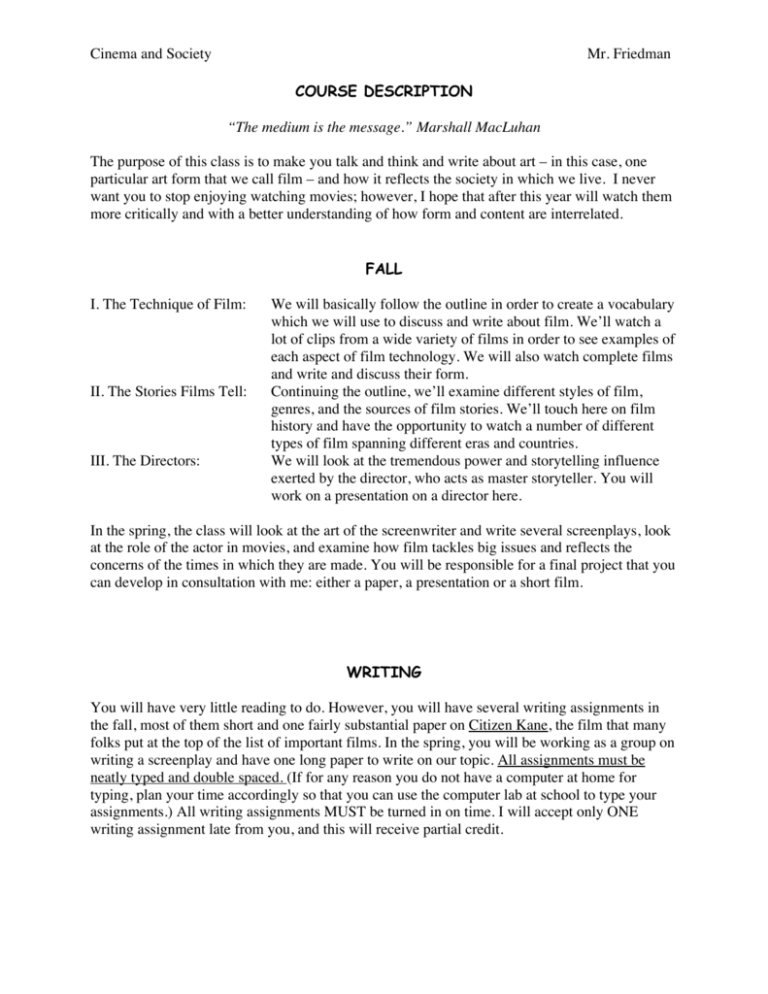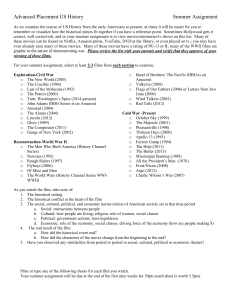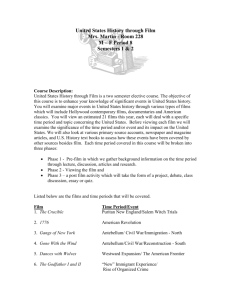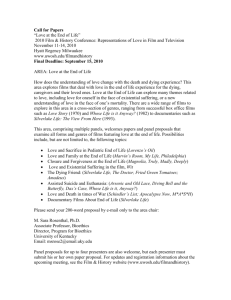Film Studies Syllabus 2010
advertisement

Cinema and Society Mr. Friedman COURSE DESCRIPTION “The medium is the message.” Marshall MacLuhan The purpose of this class is to make you talk and think and write about art – in this case, one particular art form that we call film – and how it reflects the society in which we live. I never want you to stop enjoying watching movies; however, I hope that after this year will watch them more critically and with a better understanding of how form and content are interrelated. FALL I. The Technique of Film: II. The Stories Films Tell: III. The Directors: We will basically follow the outline in order to create a vocabulary which we will use to discuss and write about film. We’ll watch a lot of clips from a wide variety of films in order to see examples of each aspect of film technology. We will also watch complete films and write and discuss their form. Continuing the outline, we’ll examine different styles of film, genres, and the sources of film stories. We’ll touch here on film history and have the opportunity to watch a number of different types of film spanning different eras and countries. We will look at the tremendous power and storytelling influence exerted by the director, who acts as master storyteller. You will work on a presentation on a director here. In the spring, the class will look at the art of the screenwriter and write several screenplays, look at the role of the actor in movies, and examine how film tackles big issues and reflects the concerns of the times in which they are made. You will be responsible for a final project that you can develop in consultation with me: either a paper, a presentation or a short film. WRITING You will have very little reading to do. However, you will have several writing assignments in the fall, most of them short and one fairly substantial paper on Citizen Kane, the film that many folks put at the top of the list of important films. In the spring, you will be working as a group on writing a screenplay and have one long paper to write on our topic. All assignments must be neatly typed and double spaced. (If for any reason you do not have a computer at home for typing, plan your time accordingly so that you can use the computer lab at school to type your assignments.) All writing assignments MUST be turned in on time. I will accept only ONE writing assignment late from you, and this will receive partial credit. GRADING Grading will be based on the following: 1) Class attendance and participation in discussions and projects. I will expect everyone to take part in class discussions; no one will be allowed to dominate the talk. In all our discussions, you are expected to observe the proper etiquette: listen politely to each other and respect all opinions or ideas, even those with which you disagree. 2) Film Etiquette: This is not a movie theatre but a classroom, and in this classroom we watch films quietly and intently. We do not talk during films, to each other, or to the screen. I plan to keep the lights low during the watching of a film, but if people sleep or talk, the lights go up and stay up. Also, as much as I like popcorn and snacks during a film, the PAC has a no food or drink rule. Only water will be allowed in class. 3) Prompt completion of all written and project assignments. (If you are 4) absent for any reason, including athletics, you are responsible for watching and writing about the films you missed seeing in class. They are all available on DVD; some may even be available online.) I can’t stress enough how important it is that you come to class every day on time, watch all the films seriously, participate in class discussions and complete all assignments. A film scholar is not a passive accepter of information: (s)he questions and argues and comments and wonders about the films (s)he sees. Film, like all art, is open to multiple interpretations (which does NOT mean that you or I can’t be wrong . . . but that’s okay!) I will do my best to provide a safe and comfortable atmosphere for us to engage in this exchange of ideas. In addition to watching films at school and home, I encourage you to go to the multiplex as often as possible in order to see films the way they were meant to be seen – on the wide screen! (You can eat there, too!!) If possible, I will arrange one or two field trips to see some films throughout the year.






